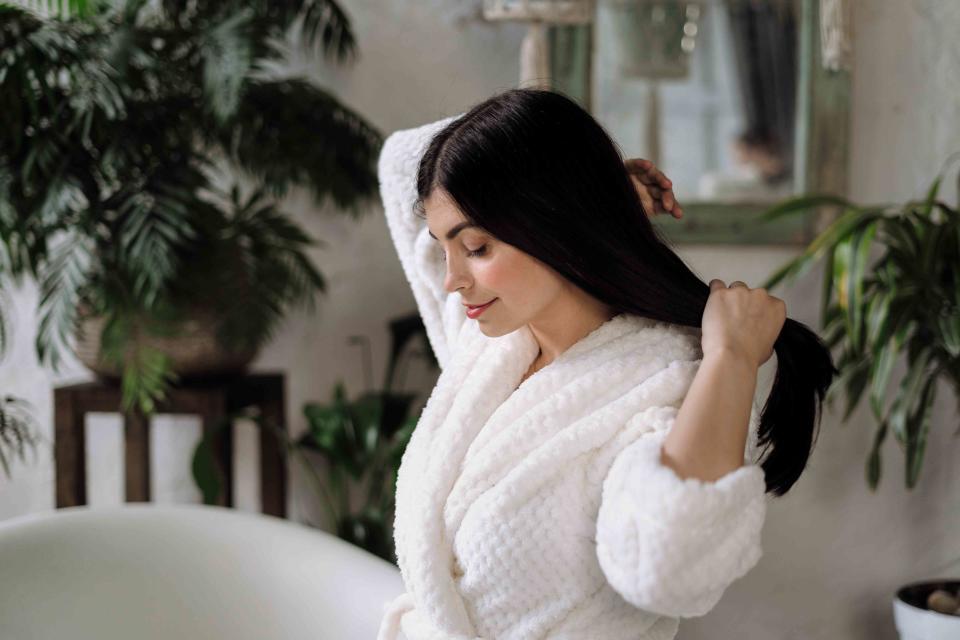Hair Gloss vs. Hair Glaze: What's the Difference?
Spoiler: Both treatments will make your hair unbelievably shiny.

Getty Images
In the beauty world, hair glosses and hair glazes add shine back to your hair — among other benefits. Still, they have some small differences that are important to consider before deciding which is right for you. Ahead, we consult two hair experts to learn more about hair gloss vs. hair glaze. Find out what both treatments entail, how long they last, as well as at-home products you can try yourself.
Related: The 13 Best Hair Products for Shine of 2023 That Give Supermodel-Level Luster
Keep reading to discover everything there is to know about hair gloss vs. glaze.
What Is Hair Gloss?
A hair gloss treatment is usually a service done by a hair professional at a salon. "This treatment adds noticeable shine to the hair, and can also dip into the cuticle to deposit color and prevent your newly-added hair dye from falling dull," explains Goldwell Stylist, Steven Picciano. Most of the time, hair glosses take the form of a treatment or a mask that's applied to the hair for a certain amount of minutes and then rinsed out.
"With a color gloss, we can customize and enhance natural tones, softly blend gray hair, neutralize unwanted warmth, or create the most perfect shades of blonde," he explains. "Most color lines also have a clear as well, so if you love your natural color and just want to build in shine, that's possible, too."
Related: This Hair Gloss Cuts Down Brassiness and Keeps My Strands Looking Fresh Without a Salon Visit
What Is Hair Glaze?
A hair glaze is a non-permanent treatment color treatment that adds shine to hair and can help with flyaways and frizz. Think of it as a deep conditioning treatment that seals in color and tones it.
When it comes to natural or textured hair, the service is typically applied through a rinse, says Jennifer Lord, hair designer and author of Natural Hollywood. Basically, the glaze is a deposit of color that will sit on top of the hair.
Hair Gloss vs. Hair Glaze: What's The Difference?
While hair glosses and hair glazes are extremely similar, there are a few key differences. A gloss is great for shifting colors, neutralizing brassiness, and blending grown-out roots, plus boosting shine. On the flip side, a glaze is ideal for adding shine to the hair and making frizzy hair more manageable, with a hint of toning.
Also, glazes typically don't last as long as a gloss, adds Leland Hirsch, hair colorist and founder of Celeb Luxury. "They are both temporary non-committal treatments that will fade on their own," says Hirsch. "The biggest differentiation between a gloss and a glaze is its lifespan. Glazes have no ammonia or peroxide, so will last in the hair up to one week, whereas a gloss can last up to four weeks."
Related: Everything You Need To Know About Hair Toner
The Best At-Home Hair Gloss Treatments
There are a few at-home options that might not last as long but have a more reasonable price tag than something you'd find in a salon. Celebrity hairstylist Kristin Ess developed a Signature Gloss Treatment available in multiple shades, as well as clear, which neutralizes brass, adds shine to the hair, and deep conditions. Another option is DpHue's Color Boosting Gloss + Deep Conditioning Treatment, a multi-tasking treatment that adds color and conditions the hair.
Lord's favorite at-home gloss treatment for textured hair is Bread Beauty Supply Hair Oil, enriched with Kakadu plum to smooth and shine curls. "It's light and smells amazing," she says. But if you're looking for a more affordable and simpler at-home treatment, Lord suggests looking around your kitchen. Oils like coconut or olive can deliver a similar result as a gloss.
Related: The Right Type of Coconut Oil for Hair and Skincare
The Best At-Home Hair Glaze Treatments
Colorists can use different types of products to give you that glaze-like result — for example, Hirsch uses GemLites and Viral Colorditioner by Celeb Luxury. While Lord recommends seeing a professional for a glaze to ensure an all-over and even application, there are also other at-home versions of this treatment, like the Living Proof Color Care Whipped Glaze and Oribe Glaze for Beautiful Color.
The Bottom Line
A hair gloss or hair glaze can be a wonderful add-on treatment to your color service or one that's done in-between color sessions to maintain your color and boost shine. Which one you get depends on the current state of your hair and your desired results. Whichever one you choose, a color-safe shampoo and conditioner with bond repair technology, like Redken's Acidic Bonding Concentrate, will help keep hair strong and healthy.
Frequently Asked Questions
What hair glosses do salons use?
Picciano prefers to use Goldwell Colorance's gloss system, which lasts about four to six weeks, or for about 20 shampoos. Redken Shades EQ Gloss is another popular gloss product used by colorists. Since the gloss fades gradually over time, it's a good way to try a new color without making a full commitment or doing damage to your hair. Redken's formula is also ammonia-free, so it's gentle on strands.
Is hair gloss or glaze better for natural hair?
According to Lord, both are great for natural hair. "The benefit of a gloss is that it brings out the shine on natural hair which otherwise absorbs rather than reflects light. The benefit of glaze is that it has no harmful chemicals and fills in gaps of the potentially damaged hair shaft allowing the hair to feel conditioned and moisturized."
Can hair glossing and glazing damage hair?
When used correctly and by a salon professional, both treatments should not damage hair. However, since hair gloss uses a small amount of ammonia, hair glaze is the gentler of the two.
For more InStyle news, make sure to sign up for our newsletter!
Read the original article on InStyle.

